Comprehensive Report: Dental Care and Ethicolegal Issues in Australia
VerifiedAdded on 2022/10/06
|11
|1590
|37
Report
AI Summary
This report provides a comprehensive overview of the dental care system in Australia, examining its structure, funding, and regulatory mechanisms. It delves into the legal framework governing dental services, highlighting the roles of governmental and non-governmental organizations. The report addresses key challenges within the Australian dental health system, such as growing demand, increasing costs, and the need for technological advancements. Furthermore, it explores the core ethical principles of autonomy, beneficence, non-maleficence, and justice in the context of dental care, emphasizing their importance in patient care. The report also discusses ethicolegal issues related to health service delivery, including the role of charitable institutions and stakeholder dependencies. In conclusion, it underscores the importance of dental health equity and the need for effective solutions to address the financial burden and health disparities faced by Australians. References are provided for further reading.

Health Law and Ethics
Paraphrase This Document
Need a fresh take? Get an instant paraphrase of this document with our AI Paraphraser
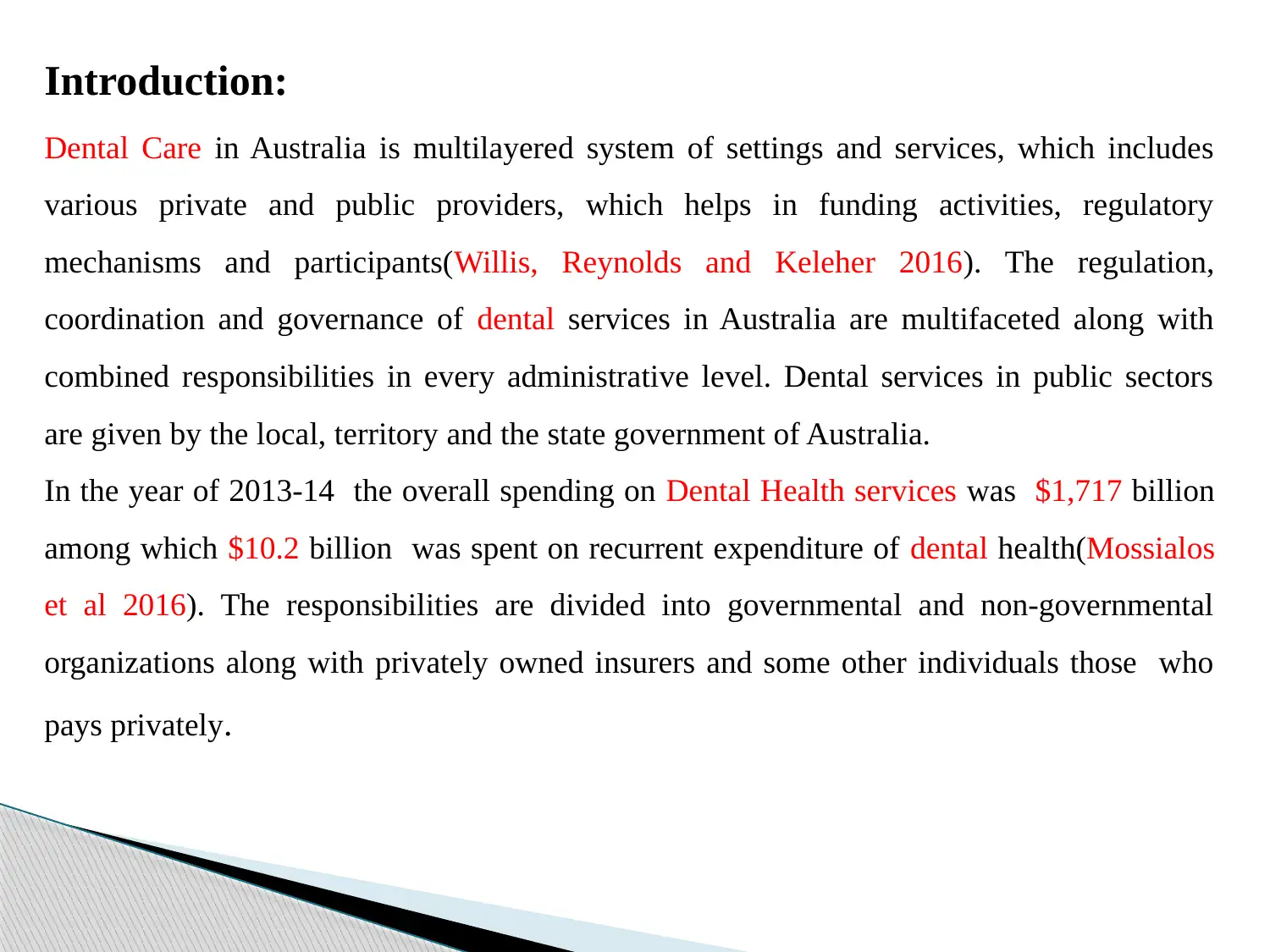
Introduction:
Dental Care in Australia is multilayered system of settings and services, which includes
various private and public providers, which helps in funding activities, regulatory
mechanisms and participants(Willis, Reynolds and Keleher 2016). The regulation,
coordination and governance of dental services in Australia are multifaceted along with
combined responsibilities in every administrative level. Dental services in public sectors
are given by the local, territory and the state government of Australia.
In the year of 2013-14 the overall spending on Dental Health services was $1,717 billion
among which $10.2 billion was spent on recurrent expenditure of dental health(Mossialos
et al 2016). The responsibilities are divided into governmental and non-governmental
organizations along with privately owned insurers and some other individuals those who
pays privately.
Dental Care in Australia is multilayered system of settings and services, which includes
various private and public providers, which helps in funding activities, regulatory
mechanisms and participants(Willis, Reynolds and Keleher 2016). The regulation,
coordination and governance of dental services in Australia are multifaceted along with
combined responsibilities in every administrative level. Dental services in public sectors
are given by the local, territory and the state government of Australia.
In the year of 2013-14 the overall spending on Dental Health services was $1,717 billion
among which $10.2 billion was spent on recurrent expenditure of dental health(Mossialos
et al 2016). The responsibilities are divided into governmental and non-governmental
organizations along with privately owned insurers and some other individuals those who
pays privately.
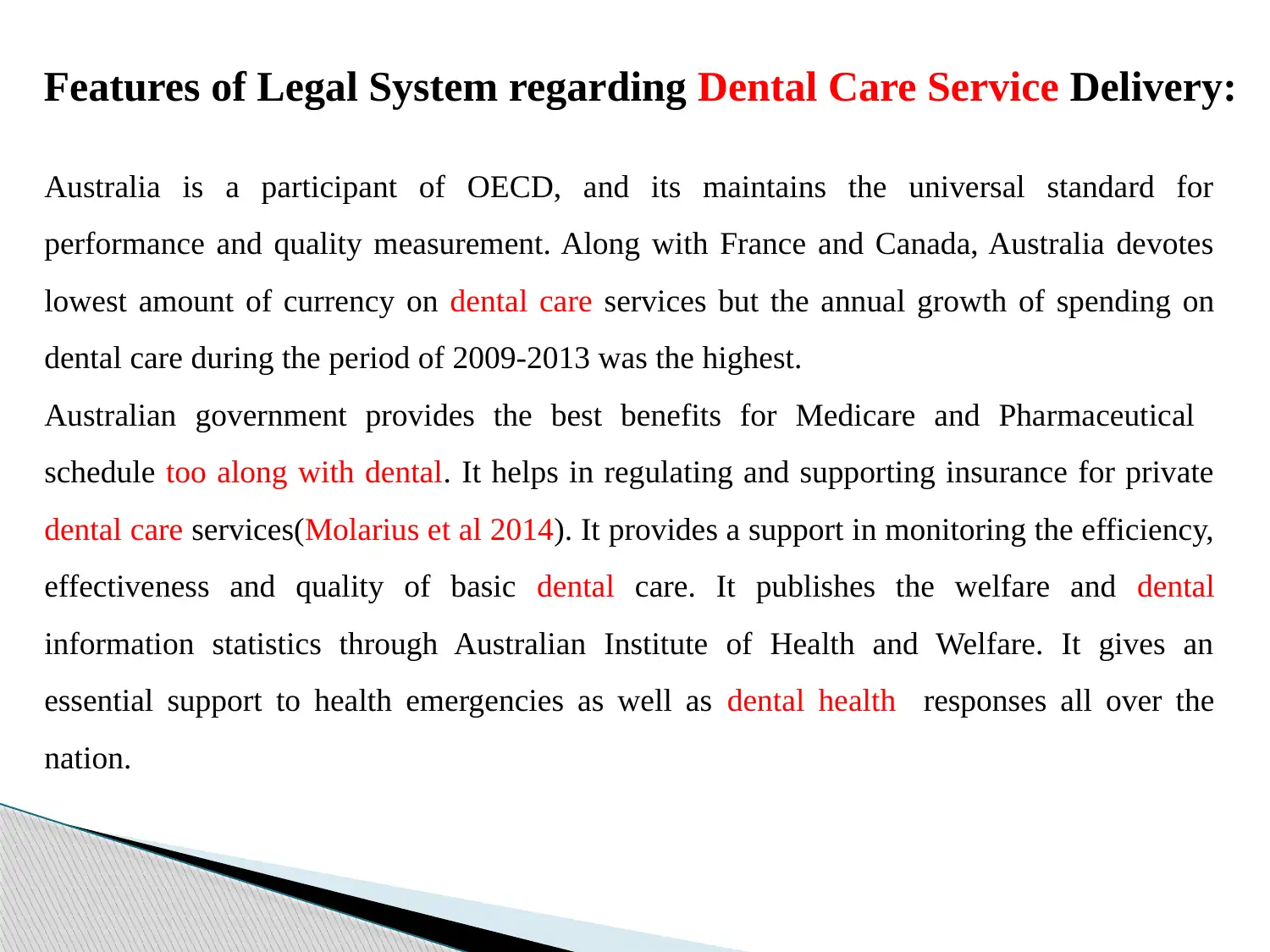
Features of Legal System regarding Dental Care Service Delivery:
Australia is a participant of OECD, and its maintains the universal standard for
performance and quality measurement. Along with France and Canada, Australia devotes
lowest amount of currency on dental care services but the annual growth of spending on
dental care during the period of 2009-2013 was the highest.
Australian government provides the best benefits for Medicare and Pharmaceutical
schedule too along with dental. It helps in regulating and supporting insurance for private
dental care services(Molarius et al 2014). It provides a support in monitoring the efficiency,
effectiveness and quality of basic dental care. It publishes the welfare and dental
information statistics through Australian Institute of Health and Welfare. It gives an
essential support to health emergencies as well as dental health responses all over the
nation.
Australia is a participant of OECD, and its maintains the universal standard for
performance and quality measurement. Along with France and Canada, Australia devotes
lowest amount of currency on dental care services but the annual growth of spending on
dental care during the period of 2009-2013 was the highest.
Australian government provides the best benefits for Medicare and Pharmaceutical
schedule too along with dental. It helps in regulating and supporting insurance for private
dental care services(Molarius et al 2014). It provides a support in monitoring the efficiency,
effectiveness and quality of basic dental care. It publishes the welfare and dental
information statistics through Australian Institute of Health and Welfare. It gives an
essential support to health emergencies as well as dental health responses all over the
nation.
⊘ This is a preview!⊘
Do you want full access?
Subscribe today to unlock all pages.

Trusted by 1+ million students worldwide
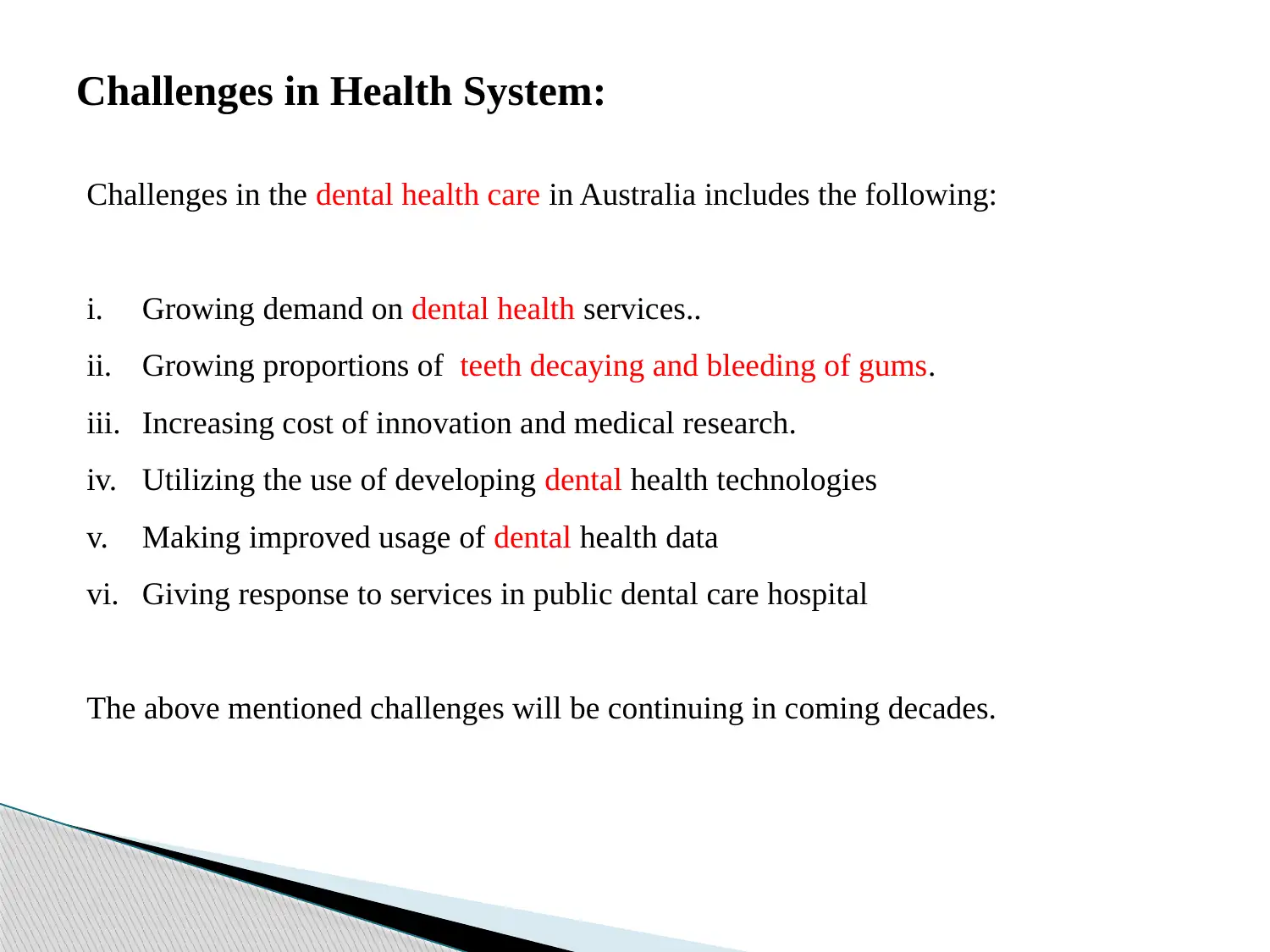
Challenges in Health System:
Challenges in the dental health care in Australia includes the following:
i. Growing demand on dental health services..
ii. Growing proportions of teeth decaying and bleeding of gums.
iii. Increasing cost of innovation and medical research.
iv. Utilizing the use of developing dental health technologies
v. Making improved usage of dental health data
vi. Giving response to services in public dental care hospital
The above mentioned challenges will be continuing in coming decades.
Challenges in the dental health care in Australia includes the following:
i. Growing demand on dental health services..
ii. Growing proportions of teeth decaying and bleeding of gums.
iii. Increasing cost of innovation and medical research.
iv. Utilizing the use of developing dental health technologies
v. Making improved usage of dental health data
vi. Giving response to services in public dental care hospital
The above mentioned challenges will be continuing in coming decades.
Paraphrase This Document
Need a fresh take? Get an instant paraphrase of this document with our AI Paraphraser
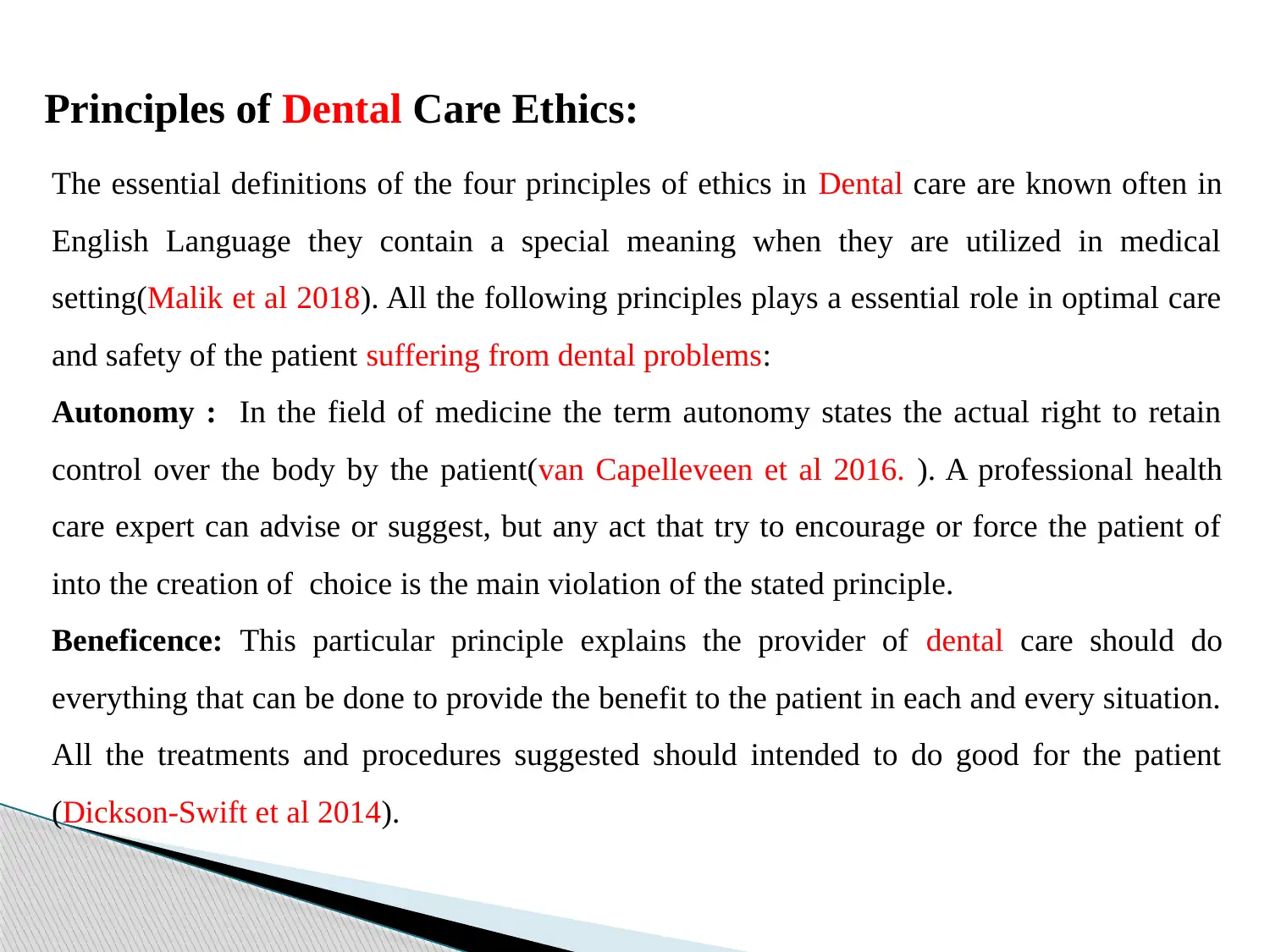
Principles of Dental Care Ethics:
The essential definitions of the four principles of ethics in Dental care are known often in
English Language they contain a special meaning when they are utilized in medical
setting(Malik et al 2018). All the following principles plays a essential role in optimal care
and safety of the patient suffering from dental problems:
Autonomy : In the field of medicine the term autonomy states the actual right to retain
control over the body by the patient(van Capelleveen et al 2016. ). A professional health
care expert can advise or suggest, but any act that try to encourage or force the patient of
into the creation of choice is the main violation of the stated principle.
Beneficence: This particular principle explains the provider of dental care should do
everything that can be done to provide the benefit to the patient in each and every situation.
All the treatments and procedures suggested should intended to do good for the patient
(Dickson-Swift et al 2014).
The essential definitions of the four principles of ethics in Dental care are known often in
English Language they contain a special meaning when they are utilized in medical
setting(Malik et al 2018). All the following principles plays a essential role in optimal care
and safety of the patient suffering from dental problems:
Autonomy : In the field of medicine the term autonomy states the actual right to retain
control over the body by the patient(van Capelleveen et al 2016. ). A professional health
care expert can advise or suggest, but any act that try to encourage or force the patient of
into the creation of choice is the main violation of the stated principle.
Beneficence: This particular principle explains the provider of dental care should do
everything that can be done to provide the benefit to the patient in each and every situation.
All the treatments and procedures suggested should intended to do good for the patient
(Dickson-Swift et al 2014).
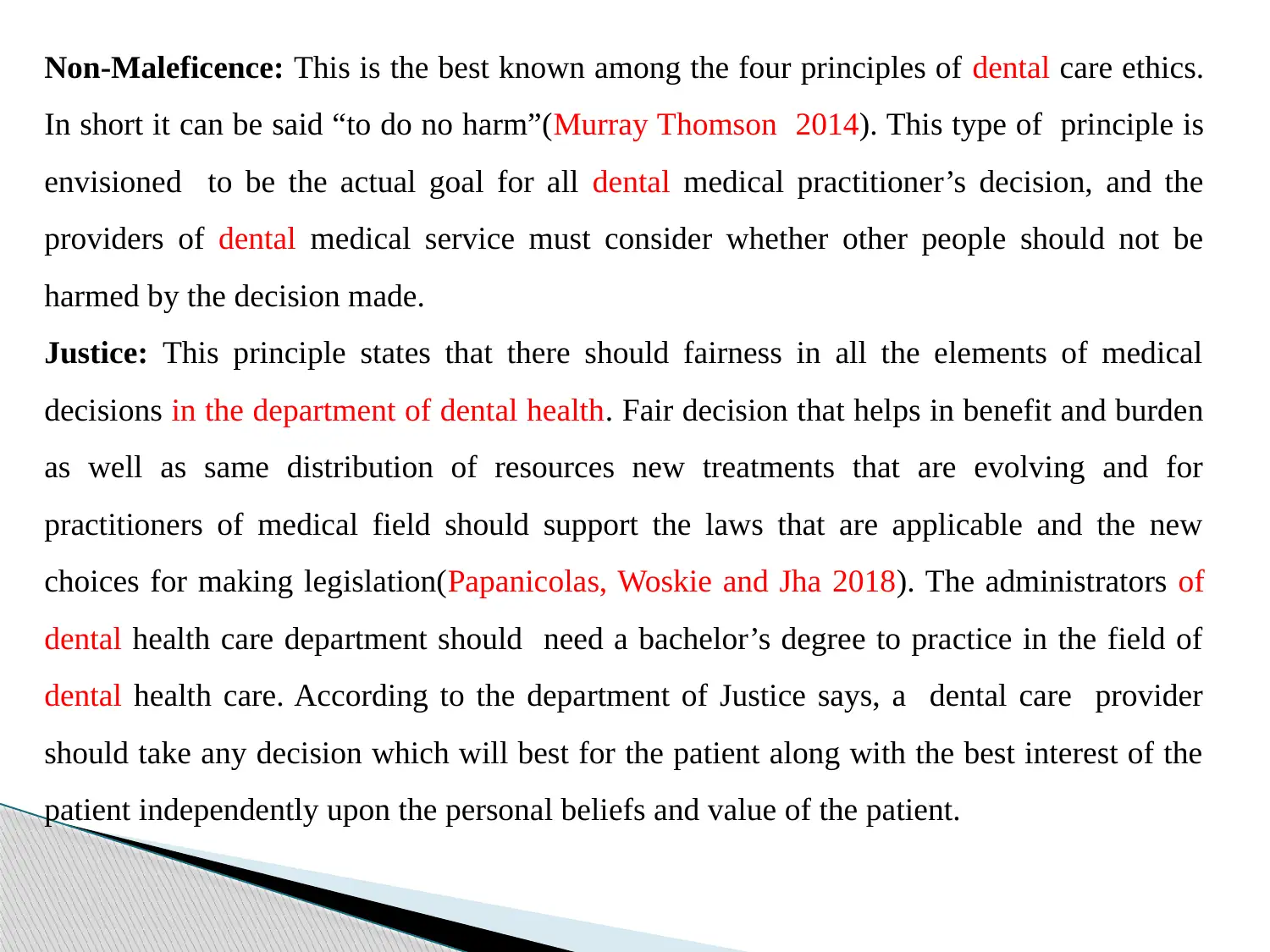
Non-Maleficence: This is the best known among the four principles of dental care ethics.
In short it can be said “to do no harm”(Murray Thomson 2014). This type of principle is
envisioned to be the actual goal for all dental medical practitioner’s decision, and the
providers of dental medical service must consider whether other people should not be
harmed by the decision made.
Justice: This principle states that there should fairness in all the elements of medical
decisions in the department of dental health. Fair decision that helps in benefit and burden
as well as same distribution of resources new treatments that are evolving and for
practitioners of medical field should support the laws that are applicable and the new
choices for making legislation(Papanicolas, Woskie and Jha 2018). The administrators of
dental health care department should need a bachelor’s degree to practice in the field of
dental health care. According to the department of Justice says, a dental care provider
should take any decision which will best for the patient along with the best interest of the
patient independently upon the personal beliefs and value of the patient.
In short it can be said “to do no harm”(Murray Thomson 2014). This type of principle is
envisioned to be the actual goal for all dental medical practitioner’s decision, and the
providers of dental medical service must consider whether other people should not be
harmed by the decision made.
Justice: This principle states that there should fairness in all the elements of medical
decisions in the department of dental health. Fair decision that helps in benefit and burden
as well as same distribution of resources new treatments that are evolving and for
practitioners of medical field should support the laws that are applicable and the new
choices for making legislation(Papanicolas, Woskie and Jha 2018). The administrators of
dental health care department should need a bachelor’s degree to practice in the field of
dental health care. According to the department of Justice says, a dental care provider
should take any decision which will best for the patient along with the best interest of the
patient independently upon the personal beliefs and value of the patient.
⊘ This is a preview!⊘
Do you want full access?
Subscribe today to unlock all pages.

Trusted by 1+ million students worldwide
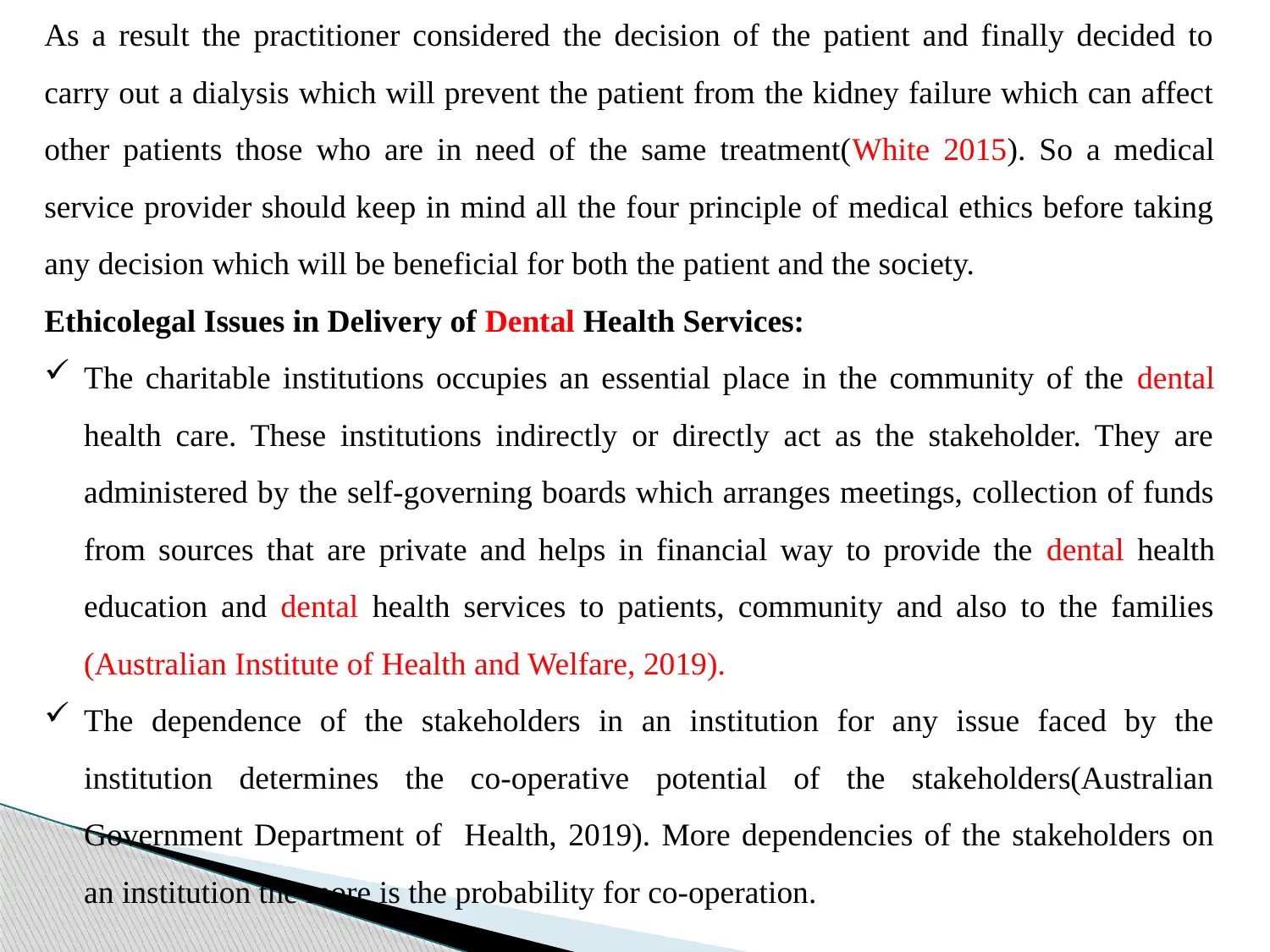
As a result the practitioner considered the decision of the patient and finally decided to
carry out a dialysis which will prevent the patient from the kidney failure which can affect
other patients those who are in need of the same treatment(White 2015). So a medical
service provider should keep in mind all the four principle of medical ethics before taking
any decision which will be beneficial for both the patient and the society.
Ethicolegal Issues in Delivery of Dental Health Services:
The charitable institutions occupies an essential place in the community of the dental
health care. These institutions indirectly or directly act as the stakeholder. They are
administered by the self-governing boards which arranges meetings, collection of funds
from sources that are private and helps in financial way to provide the dental health
education and dental health services to patients, community and also to the families
(Australian Institute of Health and Welfare, 2019).
The dependence of the stakeholders in an institution for any issue faced by the
institution determines the co-operative potential of the stakeholders(Australian
Government Department of Health, 2019). More dependencies of the stakeholders on
an institution the more is the probability for co-operation.
carry out a dialysis which will prevent the patient from the kidney failure which can affect
other patients those who are in need of the same treatment(White 2015). So a medical
service provider should keep in mind all the four principle of medical ethics before taking
any decision which will be beneficial for both the patient and the society.
Ethicolegal Issues in Delivery of Dental Health Services:
The charitable institutions occupies an essential place in the community of the dental
health care. These institutions indirectly or directly act as the stakeholder. They are
administered by the self-governing boards which arranges meetings, collection of funds
from sources that are private and helps in financial way to provide the dental health
education and dental health services to patients, community and also to the families
(Australian Institute of Health and Welfare, 2019).
The dependence of the stakeholders in an institution for any issue faced by the
institution determines the co-operative potential of the stakeholders(Australian
Government Department of Health, 2019). More dependencies of the stakeholders on
an institution the more is the probability for co-operation.
Paraphrase This Document
Need a fresh take? Get an instant paraphrase of this document with our AI Paraphraser
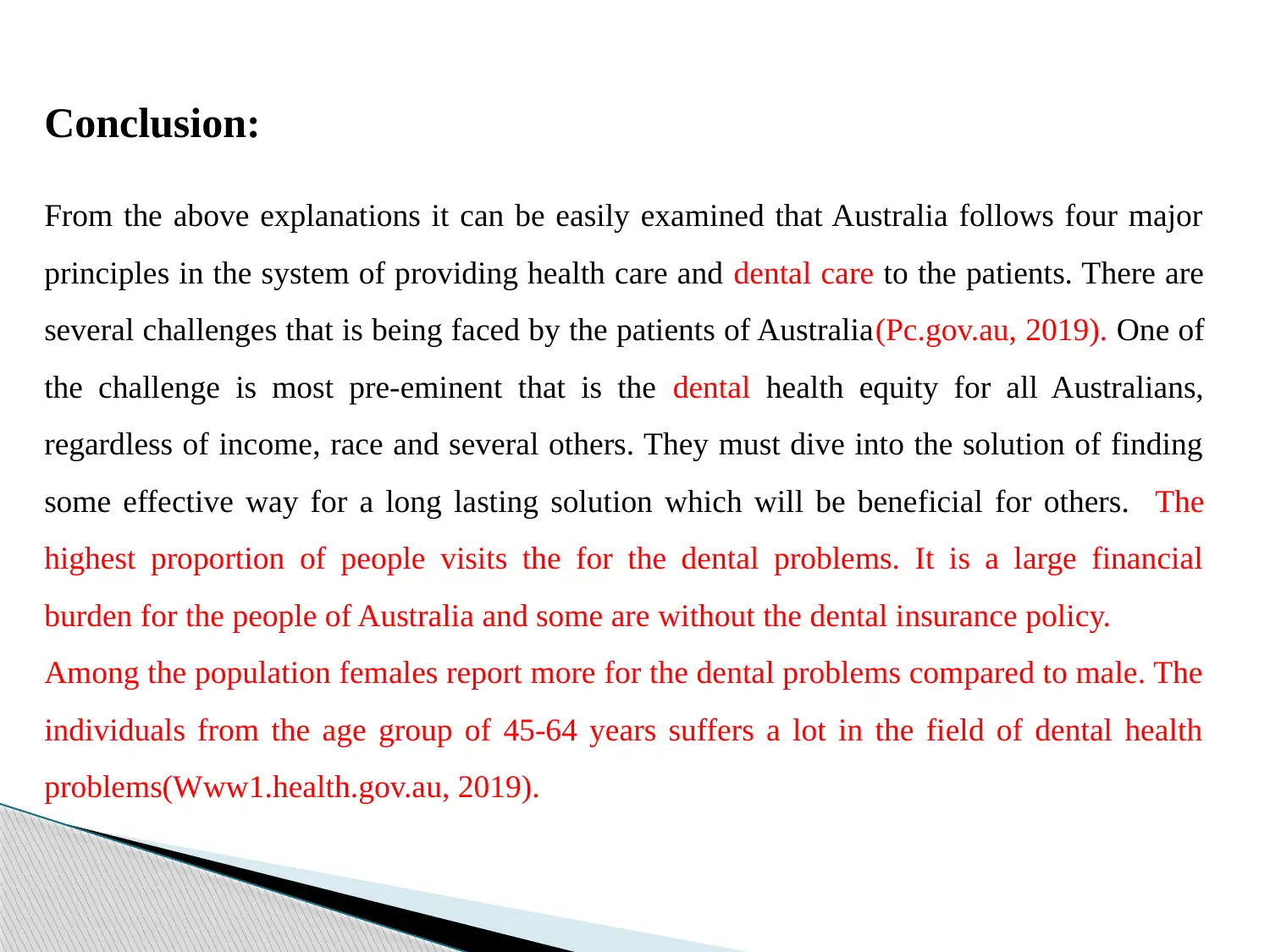
Conclusion:
From the above explanations it can be easily examined that Australia follows four major
principles in the system of providing health care and dental care to the patients. There are
several challenges that is being faced by the patients of Australia(Pc.gov.au, 2019). One of
the challenge is most pre-eminent that is the dental health equity for all Australians,
regardless of income, race and several others. They must dive into the solution of finding
some effective way for a long lasting solution which will be beneficial for others. The
highest proportion of people visits the for the dental problems. It is a large financial
burden for the people of Australia and some are without the dental insurance policy.
Among the population females report more for the dental problems compared to male. The
individuals from the age group of 45-64 years suffers a lot in the field of dental health
problems(Www1.health.gov.au, 2019).
From the above explanations it can be easily examined that Australia follows four major
principles in the system of providing health care and dental care to the patients. There are
several challenges that is being faced by the patients of Australia(Pc.gov.au, 2019). One of
the challenge is most pre-eminent that is the dental health equity for all Australians,
regardless of income, race and several others. They must dive into the solution of finding
some effective way for a long lasting solution which will be beneficial for others. The
highest proportion of people visits the for the dental problems. It is a large financial
burden for the people of Australia and some are without the dental insurance policy.
Among the population females report more for the dental problems compared to male. The
individuals from the age group of 45-64 years suffers a lot in the field of dental health
problems(Www1.health.gov.au, 2019).
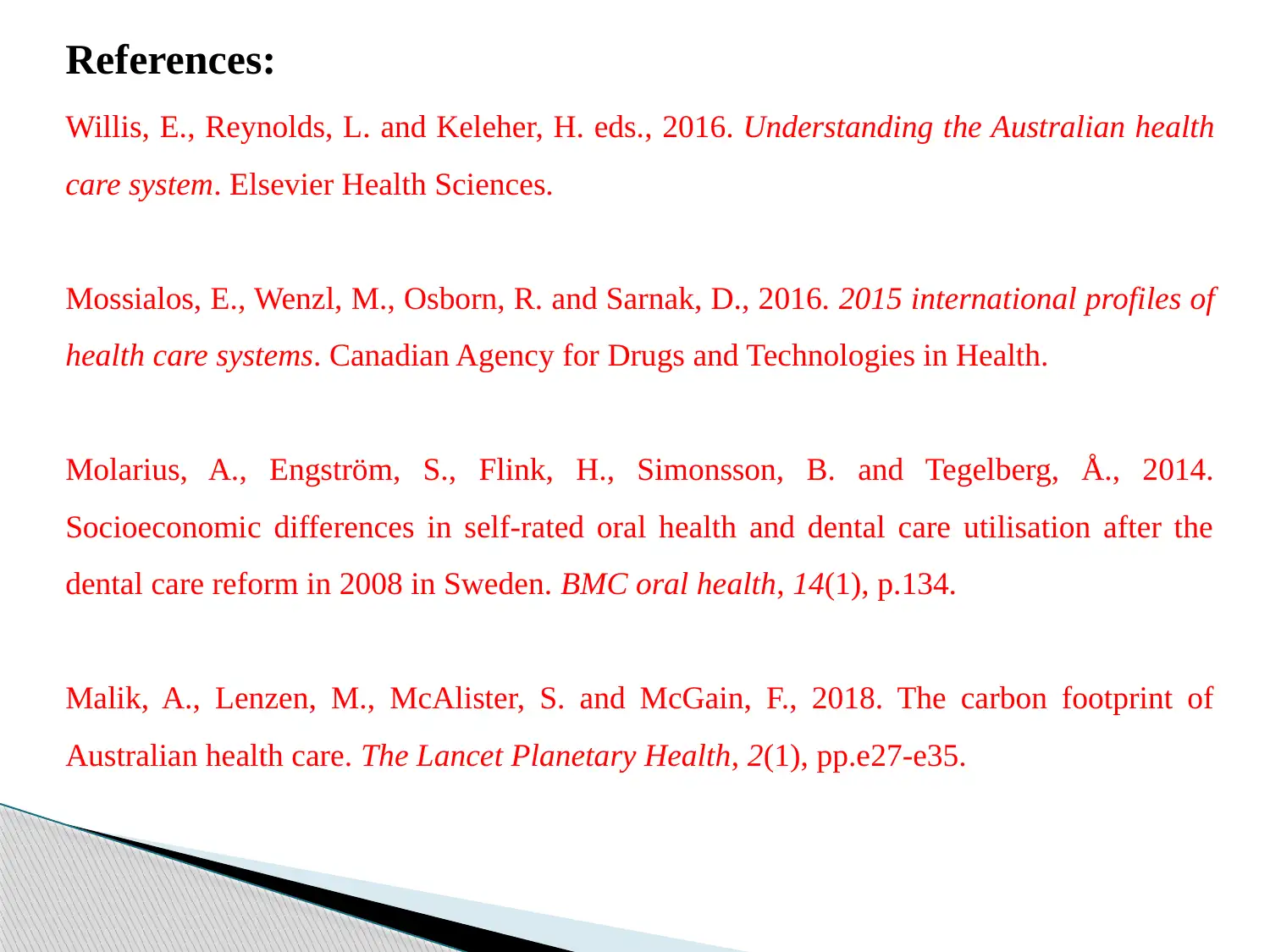
References:
Willis, E., Reynolds, L. and Keleher, H. eds., 2016. Understanding the Australian health
care system. Elsevier Health Sciences.
Mossialos, E., Wenzl, M., Osborn, R. and Sarnak, D., 2016. 2015 international profiles of
health care systems. Canadian Agency for Drugs and Technologies in Health.
Molarius, A., Engström, S., Flink, H., Simonsson, B. and Tegelberg, Å., 2014.
Socioeconomic differences in self-rated oral health and dental care utilisation after the
dental care reform in 2008 in Sweden. BMC oral health, 14(1), p.134.
Malik, A., Lenzen, M., McAlister, S. and McGain, F., 2018. The carbon footprint of
Australian health care. The Lancet Planetary Health, 2(1), pp.e27-e35.
Willis, E., Reynolds, L. and Keleher, H. eds., 2016. Understanding the Australian health
care system. Elsevier Health Sciences.
Mossialos, E., Wenzl, M., Osborn, R. and Sarnak, D., 2016. 2015 international profiles of
health care systems. Canadian Agency for Drugs and Technologies in Health.
Molarius, A., Engström, S., Flink, H., Simonsson, B. and Tegelberg, Å., 2014.
Socioeconomic differences in self-rated oral health and dental care utilisation after the
dental care reform in 2008 in Sweden. BMC oral health, 14(1), p.134.
Malik, A., Lenzen, M., McAlister, S. and McGain, F., 2018. The carbon footprint of
Australian health care. The Lancet Planetary Health, 2(1), pp.e27-e35.
⊘ This is a preview!⊘
Do you want full access?
Subscribe today to unlock all pages.

Trusted by 1+ million students worldwide
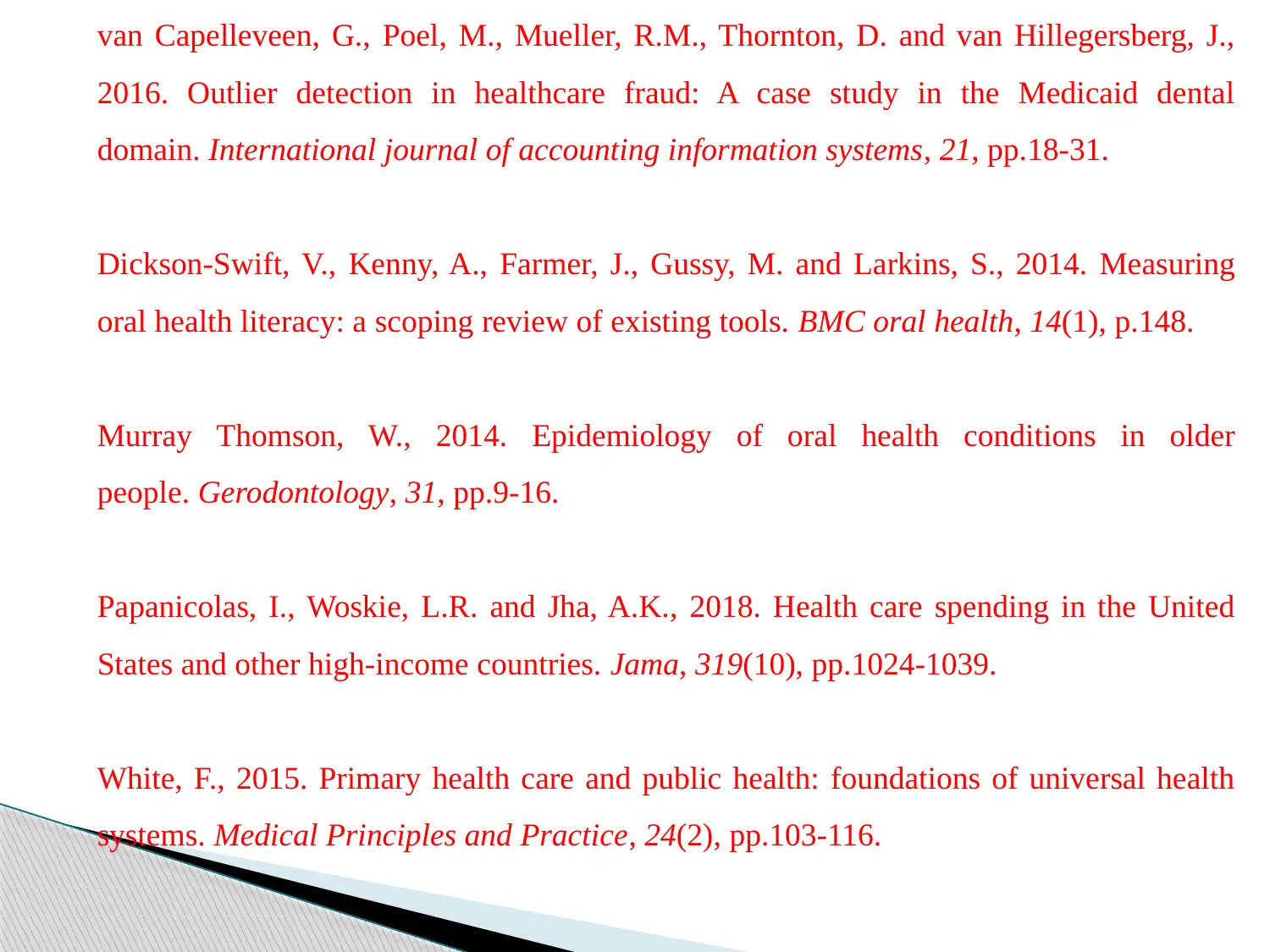
van Capelleveen, G., Poel, M., Mueller, R.M., Thornton, D. and van Hillegersberg, J.,
2016. Outlier detection in healthcare fraud: A case study in the Medicaid dental
domain. International journal of accounting information systems, 21, pp.18-31.
Dickson-Swift, V., Kenny, A., Farmer, J., Gussy, M. and Larkins, S., 2014. Measuring
oral health literacy: a scoping review of existing tools. BMC oral health, 14(1), p.148.
Murray Thomson, W., 2014. Epidemiology of oral health conditions in older
people. Gerodontology, 31, pp.9-16.
Papanicolas, I., Woskie, L.R. and Jha, A.K., 2018. Health care spending in the United
States and other high-income countries. Jama, 319(10), pp.1024-1039.
White, F., 2015. Primary health care and public health: foundations of universal health
systems. Medical Principles and Practice, 24(2), pp.103-116.
2016. Outlier detection in healthcare fraud: A case study in the Medicaid dental
domain. International journal of accounting information systems, 21, pp.18-31.
Dickson-Swift, V., Kenny, A., Farmer, J., Gussy, M. and Larkins, S., 2014. Measuring
oral health literacy: a scoping review of existing tools. BMC oral health, 14(1), p.148.
Murray Thomson, W., 2014. Epidemiology of oral health conditions in older
people. Gerodontology, 31, pp.9-16.
Papanicolas, I., Woskie, L.R. and Jha, A.K., 2018. Health care spending in the United
States and other high-income countries. Jama, 319(10), pp.1024-1039.
White, F., 2015. Primary health care and public health: foundations of universal health
systems. Medical Principles and Practice, 24(2), pp.103-116.
Paraphrase This Document
Need a fresh take? Get an instant paraphrase of this document with our AI Paraphraser
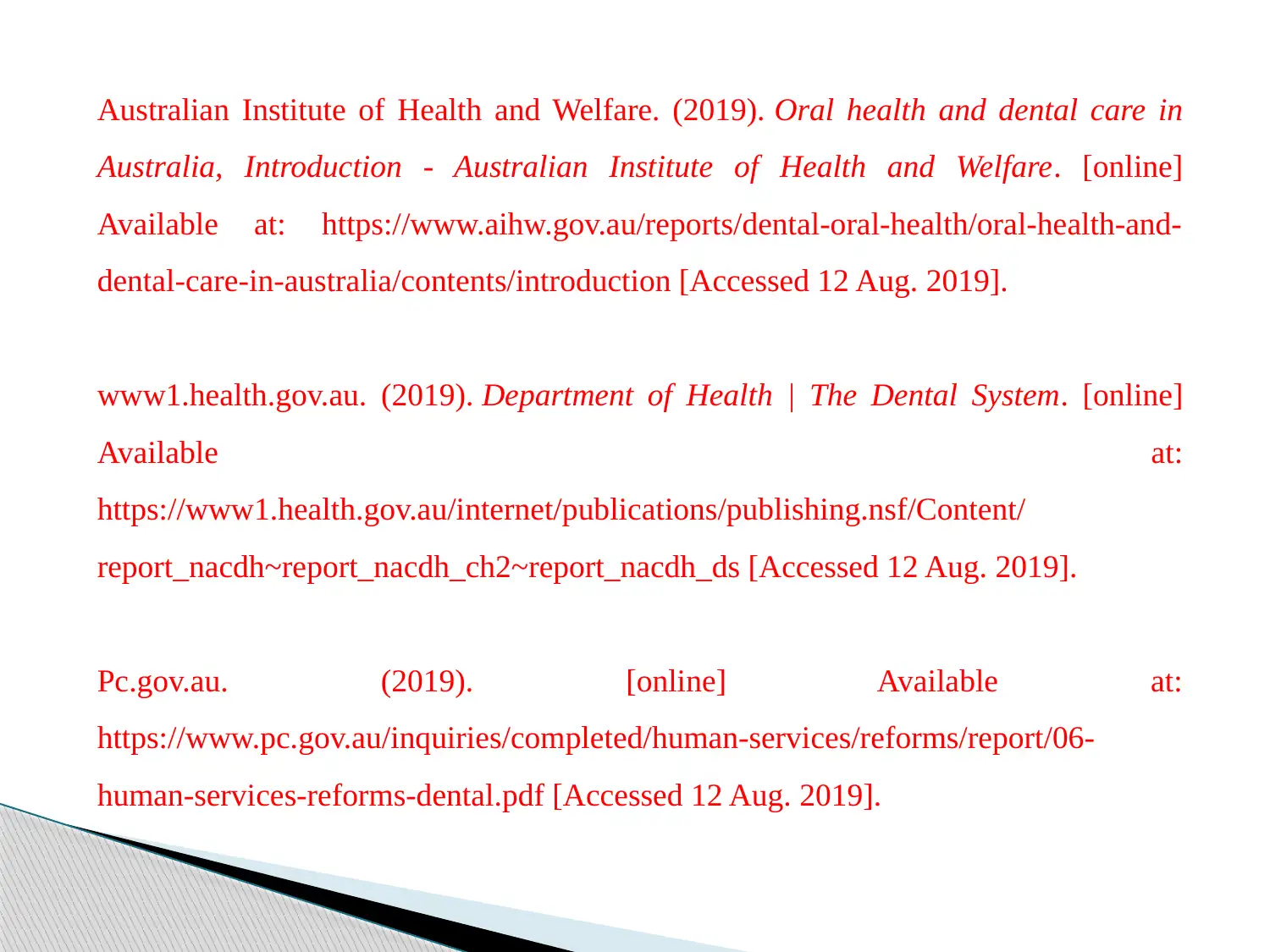
Australian Institute of Health and Welfare. (2019). Oral health and dental care in
Australia, Introduction - Australian Institute of Health and Welfare. [online]
Available at: https://www.aihw.gov.au/reports/dental-oral-health/oral-health-and-
dental-care-in-australia/contents/introduction [Accessed 12 Aug. 2019].
www1.health.gov.au. (2019). Department of Health | The Dental System. [online]
Available at:
https://www1.health.gov.au/internet/publications/publishing.nsf/Content/
report_nacdh~report_nacdh_ch2~report_nacdh_ds [Accessed 12 Aug. 2019].
Pc.gov.au. (2019). [online] Available at:
https://www.pc.gov.au/inquiries/completed/human-services/reforms/report/06-
human-services-reforms-dental.pdf [Accessed 12 Aug. 2019].
Australia, Introduction - Australian Institute of Health and Welfare. [online]
Available at: https://www.aihw.gov.au/reports/dental-oral-health/oral-health-and-
dental-care-in-australia/contents/introduction [Accessed 12 Aug. 2019].
www1.health.gov.au. (2019). Department of Health | The Dental System. [online]
Available at:
https://www1.health.gov.au/internet/publications/publishing.nsf/Content/
report_nacdh~report_nacdh_ch2~report_nacdh_ds [Accessed 12 Aug. 2019].
Pc.gov.au. (2019). [online] Available at:
https://www.pc.gov.au/inquiries/completed/human-services/reforms/report/06-
human-services-reforms-dental.pdf [Accessed 12 Aug. 2019].
1 out of 11
Related Documents
Your All-in-One AI-Powered Toolkit for Academic Success.
+13062052269
info@desklib.com
Available 24*7 on WhatsApp / Email
![[object Object]](/_next/static/media/star-bottom.7253800d.svg)
Unlock your academic potential
Copyright © 2020–2026 A2Z Services. All Rights Reserved. Developed and managed by ZUCOL.





